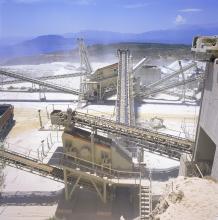Brazil’s National Union of the Cement Industry (SNIC) reports that 70% of its plants throughout the South American country are out of operation as a result of the now 11 day-old truckers' strike. A survey carried out on Monday 28 May found that less than 3% of the average daily amount of cement distributed in the country is reaching its destination.
Paulo Camillo Penna, president of SNIC, points out that the cement industry has very specific characteristics and that this makes the situation even more complex due to the truckers' strike. Inactivity is caused both by the extreme difficulty for the arrival of the inputs to the factories and by the impossibility of storing / disposing of the cement already produced.
"Cement is a perishable product requiring special storage and transport conditions. Storage sites, for example, are designed to accumulate a maximum of three days of production, "he says. In addition, he recalls that there is a diversity of origins (roads, ports) and systems of delivery of raw materials in factories, which makes distribution more difficult.
For the next few days, the concern of the cement industry is on the issue of costs involved in production. The SNIC is attentive both to the increasing individual costs of the inputs and also to the cost of freight, which will be increased, either by the chart established by Provisional Measure 832 (published on the 27th) or by the strong demand for the resumption of the various activities the country.
The SNIC also stresses that, after the end of the truck drivers' strike, an adjustment period of at least two to three weeks is required for the functioning of the cement plants to be standardized. And it also reminds us of the social impacts of the shutdown in the civil construction chain that is directly affecting the maintenance of jobs in the sector.




![The work site was next to a lake which required environmental protection measures to be put in place and was constantly monitored for compliance McCloskey_Building the Tourist Railroad - Cobalt Construction[1][1].jpg](/sites/agg/files/styles/medium/public/150606.jpg?itok=cZ-e9FKQ)



